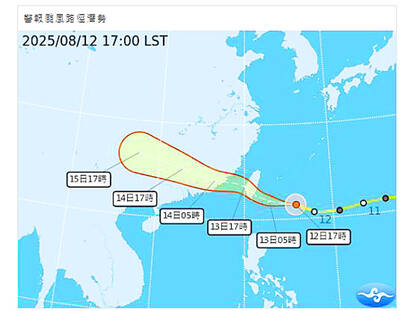Japanese Prime Minister Shinzo Abe suffered a double setback yesterday with the resignations of two female Cabinet ministers over claims they misused political funds, dealing a blow to his proclaimed gender reform drive.
Japanese Minister of Industry Yuko Obuchi and Japanese Minister of Justice Midori Matsushima quit after days of allegations that they had misspent money in what opponents insisted was an attempt to buy votes.
Their loss reduces to three the number of women in the Cabinet, after Abe’s widely praised move last month to promote a record-tying five to his administration.
“I’m the person who appointed the two. As prime minister, I take responsibility for this and deeply apologise for this situation,” Abe told reporters.
Japanese Legislator Yoichi Miyazawa, a nephew of former Japanese prime minister Kiichi Miyazawa, will replace Obuchi as industry minister, Abe said.
Yoko Kamikawa, a 61-year-old female politician and former state minister in charge of Japan’s declining birthrate, was named the new justice minister.
The double resignations are the first significant problem for Abe since he swept to power in December 2012, ending years of fragile governments that swapped prime ministers on an annual basis.
While commentators generally agreed that this would not be the end of the hard-charging prime minister, who has moved to reinvigorate Japan’s lackluster economy, they cautioned that he was now vulnerable.
“This is Abe’s first major stumble,” said Tomoaki Iwai, professor of politics at Nihon University in Tokyo. “His approval rate is likely to fall and Abe will be under pressure. If he repeats similar mistakes, it’s going to be a fatal blow to his administration.”
Obuchi, who carried on the dynasty of her father, a former prime minister, offered a fresh, youthful face on the front benches — a place generally dominated by older men.
As a mother of two, her family-friendly image was expected to help convince a skeptical public on the safety of restarting Japan’s stalled nuclear power plants.
However, her elevation had also reportedly irked some longer-serving male politicians who felt they were passed over in favor of a younger woman with little Cabinet experience.
Obuchi’s downfall started last week, when reports emerged that she had spent political funds on makeup and accessories as gifts for supporters. They were followed by claims she subsidized theater trips for voters from her rural constituency.
The claims, which were priced at tens of millions of yen over several years, were taken as evidence of attempted vote buying.

DEFENSE: The first set of three NASAMS that were previously purchased is expected to be delivered by the end of this year and deployed near the capital, sources said Taiwan plans to procure 28 more sets of M-142 High Mobility Artillery Rocket Systems (HIMARS), as well as nine additional sets of National Advanced Surface-to-Air Missile Systems (NASAMS), military sources said yesterday. Taiwan had previously purchased 29 HIMARS launchers from the US and received the first 11 last year. Once the planned purchases are completed and delivered, Taiwan would have 57 sets of HIMARS. The army has also increased the number of MGM-140 Army Tactical Missile Systems (ATACMS) purchased from 64 to 84, the sources added. Each HIMARS launch pod can carry six Guided Multiple Launch Rocket Systems, capable of

Tropical Storm Podul strengthened into a typhoon at 8pm yesterday, the Central Weather Administration (CWA) said, with a sea warning to be issued late last night or early this morning. As of 8pm, the typhoon was 1,020km east of Oluanpi (鵝鑾鼻), Taiwan’s southernmost tip, moving west at 23kph. The storm carried maximum sustained winds of 119kph and gusts reaching 155kph, the CWA said. Based on the tropical storm’s trajectory, a land warning could be issued any time from midday today, it added. CWA forecaster Chang Chun-yao (張竣堯) said Podul is a fast-moving storm that is forecast to bring its heaviest rainfall and strongest

GET TO SAFETY: Authorities were scrambling to evacuate nearly 700 people in Hualien County to prepare for overflow from a natural dam formed by a previous typhoon Typhoon Podul yesterday intensified and accelerated as it neared Taiwan, with the impact expected to be felt overnight, the Central Weather Administration (CWA) said, while the Directorate-General of Personnel Administration announced that schools and government offices in most areas of southern and eastern Taiwan would be closed today. The affected regions are Tainan, Kaohsiung and Chiayi City, and Yunlin, Chiayi, Pingtung, Hualien and Taitung counties, as well as the outlying Penghu County. As of 10pm last night, the storm was about 370km east-southeast of Taitung County, moving west-northwest at 27kph, CWA data showed. With a radius of 120km, Podul is carrying maximum sustained

TRAJECTORY: The severe tropical storm is predicted to be closest to Taiwan on Wednesday and Thursday, and would influence the nation to varying degrees, a forecaster said The Central Weather Administration (CWA) yesterday said it would likely issue a sea warning for Tropical Storm Podul tomorrow morning and a land warning that evening at the earliest. CWA forecaster Lin Ting-yi (林定宜) said the severe tropical storm is predicted to be closest to Taiwan on Wednesday and Thursday. As of 2pm yesterday, the storm was moving west at 21kph and packing sustained winds of 108kph and gusts of up to 136.8kph, the CWA said. Lin said that the tropical storm was about 1,710km east of Oluanpi (鵝鑾鼻), Taiwan’s southernmost tip, with two possible trajectories over the next one